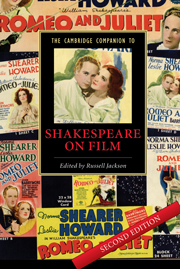Book contents
- Frontmatter
- Introduction: Shakespeare, films and the marketplace
- Part I Adaptation and its Contexts
- Part II Genres and Plays
- Part III Directors
- 9 The Shakespeare films of Laurence Olivier
- 10 Orson Welles and filmed Shakespeare
- 11 Grigori Kozintsev’s Hamlet and King Lear
- 12 Franco Zeffirelli and Shakespeare
- 13 Flamboyant realist: Kenneth Branagh
- Part IV Critical Issues
- Further Reading
- Filmography
- Index
- Series List
12 - Franco Zeffirelli and Shakespeare
from Part III - Directors
Published online by Cambridge University Press: 28 July 2007
- Frontmatter
- Introduction: Shakespeare, films and the marketplace
- Part I Adaptation and its Contexts
- Part II Genres and Plays
- Part III Directors
- 9 The Shakespeare films of Laurence Olivier
- 10 Orson Welles and filmed Shakespeare
- 11 Grigori Kozintsev’s Hamlet and King Lear
- 12 Franco Zeffirelli and Shakespeare
- 13 Flamboyant realist: Kenneth Branagh
- Part IV Critical Issues
- Further Reading
- Filmography
- Index
- Series List
Summary
Franco Zeffirelli’s contribution to the Shakespeare on screen canon continues to receive considerable commentary even though his last film of Shakespeare, Hamlet, was made as long ago as 1990. Zeffirelli has made three films of Shakespeare’s plays: The Taming of the Shrew (1966), Romeo and Juliet (1968), and Hamlet (1990). While each film clearly appropriates a particular cultural moment, they are stylistically similar in so far as they share an unmistakable operatic conception; it has been repeatedly observed that they make as much use of colour, movement and music as they do of Shakespeare’s lines. Opera, for Zeffirelli, is the complete form: it combines dance, drama, poetry, music and the visual arts. His films of Shakespeare, similarly, unashamedly aim to appeal to all the senses. Their appeal is largely sensual rather than cerebral and in this the director achieves his ambition, in defiance of his critics, to make Shakespeare, as he says, even more popular. In many respects, Zeffirelli’s screen interpretations of Shakespeare owe as much to travelogues as they do to the playtexts. Zeffirelli has no qualms about imposing his own tastes on to Shakespeare’s texts. Shakespeare is, for Zeffirelli, 'a frustrated traveller' with a desire to take his audience on a sight-seeing tour of Italy; and his union of Shakespeare with Italian Renaissance culture earned him the nickname, 'Shakespirelli'.
- Type
- Chapter
- Information
- The Cambridge Companion to Shakespeare on Film , pp. 216 - 225Publisher: Cambridge University PressPrint publication year: 2007

